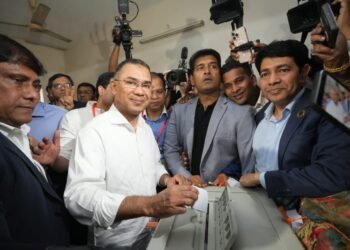In a bid to present a united front against the ruling Bharatiya Janata Party (BJP) in the upcoming Lok Sabha elections, the Aam Aadmi Party (AAP) and the Congress have come to a seat-sharing agreement for key states like Delhi, Gujarat, Haryana, Goa, and Chandigarh.
The agreement follows weeks of negotiations between the two opposition parties to maximize their electoral prospects and consolidate the anti-BJP vote bank.
Delhi | Congress and AAP announce seat-sharing in Delhi, Gujarat, Haryana, Chandigarh and Goa
In Delhi (7 seats), Congress to contest on 3 and AAP on 4
In Gujarat (26 seats), Congress to contest on 24 and AAP on 2 (in Bharuch and Bhavnagar)
In Haryana (10 seats), Congress to… pic.twitter.com/vCauAdvkUm— ANI (@ANI) February 24, 2024
Delhi Seat-Sharing Arrangement between AAP and Congress:
Under the agreement, the AAP, led by Chief Minister Arvind Kejriwal, will contest in four out of Delhi’s seven Lok Sabha seats. These include West Delhi, South Delhi, East Delhi, and New Delhi constituencies. The remaining three seats – North East Delhi, North West Delhi, and Chandni Chowk – will be contested by the Congress party.
In the previous 2019 Lok Sabha elections, the BJP swept all seven parliamentary seats in Delhi, making it a crucial battleground for the opposition parties in the upcoming polls.
Seat Sharing Model in Other States:
Apart from Delhi, the seat-sharing pact extends to several other states. In Gujarat, the AAP will contest in two constituencies – Bharuch and Bhavnagar – while in Haryana, it will field candidates in constituencies like Kurukshetra. On the other hand, the Congress will contest both seats in Goa and the sole constituency in Chandigarh.
Here’s what it looks like –
Delhi: AAP – 4 Congress – 3
Gujarat: Congress – 24 AAP – 2
Haryana: Congress – 9 AAP – 1
Goa: Congress – 2
Chandigarh: Congress – 1
Announcing the seat-sharing formula, Delhi Minister Saurabh Bharadwaj said:
“The AAP and Congress have finalised the seat-sharing agreement. In Delhi, the AAP and Congress will contest on four and three seats, respectively. In Haryana, the AAP will contest one seat, while the Congress will contest on rest of the nine seats. In Gujarat, the AAP will contest on two seats, while the Congress will contest on rest of the seats.”
VIDEO | "The AAP and Congress have finalised the seat-sharing agreement. In Delhi, the AAP and Congress will contest on four and three seats, respectively. In Haryana, the AAP will contest one seat, while the Congress will contest on rest of the nine seats. In Gujarat, the AAP… pic.twitter.com/qqx5PwMQcK
— Press Trust of India (@PTI_News) February 24, 2024
Challenges and Negotiations Of AAP-Congress Seat-Sharing Model:
The seat-sharing negotiations have not been without challenges. The process has been complicated by the aspirations of regional parties within the opposition alliance, with each party vying for a larger share of the electoral pie. The recent electoral setbacks faced by the Congress in states like Rajasthan, Madhya Pradesh, and Chhattisgarh have further complicated the negotiations, with regional parties seeking to assert their influence.
Also Read – PM Narendra Modi To Inaugurate Okha-Beyt Dwarka Signature Bridge in Gujarat: Know All Details Here
National and Regional Dynamics of this AAP-Congress Seat-Sharing Model
Beyond seat-sharing arrangements, the larger political landscape is witnessing significant realignments. The Congress has already struck a seat-sharing deal with Akhilesh Yadav’s Samajwadi Party in Uttar Pradesh, where the Congress will contest 17 seats. However, deadlock persists in Maharashtra, where the Congress and the Shiv Sena are yet to decide on eight seats.
In West Bengal, the Congress faces challenges from the Trinamool Congress, which has asserted its intention to contest all 42 seats. Negotiations between the two parties have hit a roadblock, with the Trinamool Congress unwilling to offer more than two seats to the Congress.
The seat-sharing agreement between the AAP and the Congress reflects their joint effort to present a formidable challenge to the ruling BJP in the upcoming Lok Sabha elections. However, challenges remain as national and regional dynamics shape the electoral landscape, with various parties vying for more seats in crucial battleground states.














